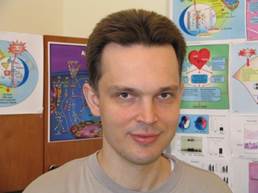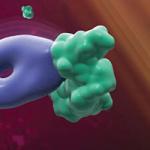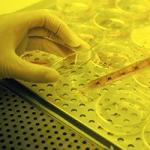
Pal Pacher, M.D., Ph.D.
Senior Investigator
Laboratory of Cardiovascular Physiology and Tissue Injury
NIAAA
Research Topics
The Laboratory of Cardiovascular Physiology and Tissue Injury (LCPTI) seeks to understand the cellular and molecular mechanisms of the complex interplay of oxidative/nitrative stress, inflammation, lipid signaling (for example endocannabinoid signaling) and cell death pathways (e.g. poly(ADP)-ribose polymerase) in tissue injury, and to identify new therapeutic targets using clinically relevant animal models of disease (e.g., ischemia reperfusion injury, cardiomyopathies/heart failure, nephropathies, cardiovascular aging, and alcohol induced cardiovascular, liver and kidney injury and neuroinflammation).
Biography
Dr. Pál Pacher received his M.D. and Ph.D. (summa cum laude) from Semmelweis University of Medicine, Hungary, in 1993 and 1999, respectively. After completing two years of research at Thomas Jefferson University in Philadelphia and an additional two years in drug development in the Boston area, he joined the National Institutes of Health (NIH) in 2003. In 2005, he became Chief of the Section on Oxidative Stress and Tissue Injury, earning tenure in 2012. By 2015, Dr. Pacher advanced to the role of Head of the Laboratory of Cardiovascular Physiology and Tissue Injury at the NIAAA/NIH.
Dr. Pacher has co-authored over 400 peer-reviewed publications, accumulating over 70,000 citations, and has been consistently ranked among the world's most highly cited researchers in multiple disciplines—including Pharmacology and Toxicology, Clinical Medicine, and Biology and Biochemistry—since 2010. He serves on the editorial boards of numerous scientific journals and has received numerous national and international awards for his research contributions. His work has been supported by prestigious grants, and he has been elected a Fellow of the American Heart Association, the American College of Cardiology, and the American Physiological Society. Additionally, Dr. Pacher is a member of the Steering Committee of the Cancer Redox Biology Faculty at the National Cancer Institute.
Selected Publications
- Matyas C, Haskó G, Liaudet L, Trojnar E, Pacher P. Interplay of cardiovascular mediators, oxidative stress and inflammation in liver disease and its complications. Nat Rev Cardiol. 2021;18(2):117-135.
- Matyas C, Erdelyi K, Trojnar E, Zhao S, Varga ZV, Paloczi J, Mukhopadhyay P, Nemeth BT, Haskó G, Cinar R, Rodrigues RM, Ait Ahmed Y, Gao B, Pacher P. Interplay of Liver-Heart Inflammatory Axis and Cannabinoid 2 Receptor Signaling in an Experimental Model of Hepatic Cardiomyopathy. Hepatology. 2020;71(4):1391-1407.
- Li X, Chang H, Bouma J, de Paus LV, Mukhopadhyay P, Paloczi J, Mustafa M, van der Horst C, Kumar SS, Wu L, Yu Y, van den Berg RJBHN, Janssen APA, Lichtman A, Liu ZJ, Pacher P, van der Stelt M, Heitman LH, Hua T. Structural basis of selective cannabinoid CB(2) receptor activation. Nat Commun. 2023;14(1):1447.
- Jiang M, Huizenga MCW, Wirt JL, Paloczi J, Amedi A, van den Berg RJBHN, Benz J, Collin L, Deng H, Di X, Driever WF, Florea BI, Grether U, Janssen APA, Hankemeier T, Heitman LH, Lam TW, Mohr F, Pavlovic A, Ruf I, van den Hurk H, Stevens AF, van der Vliet D, van der Wel T, Wittwer MB, van Boeckel CAA, Pacher P, Hohmann AG, van der Stelt M. A monoacylglycerol lipase inhibitor showing therapeutic efficacy in mice without central side effects or dependence. Nat Commun. 2023;14(1):8039.
Related Scientific Focus Areas



Molecular Biology and Biochemistry
View additional Principal Investigators in Molecular Biology and Biochemistry


This page was last updated on Tuesday, November 25, 2025